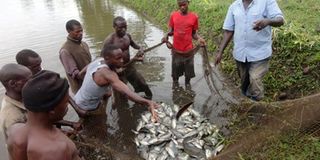Fish farming to be regulated - official

Fish farmers in Isingiro District with their harvest. Fish farming to be regulated in Uganda. File photo
What you need to know:
- In a meeting held in Entebbe to discuss the draft policy last week, Dr Drake Rukundo, the lead consultant, talked about the priority areas where the major focus is to support trade and marketing.
Entebbe. According to the World Fisheries and Aquaculture report of 2016, global aquaculture production has increased from 47.3 million tons in the previous years to 73.8 million tons in 2016.
In Uganda, however, despite the huge potential with more than 20 per cent surface area covered by fresh water bodies, availability of native species, locally available feed inputs, suitable climate for fish growth, the production and productivity of aquaculture has remained below the optimum production levels.
There are only 100,000 metric tonnes annually against the desired national target of 300,000 metric tonnes.
The development of aquaculture industry to the national economy is for purposes of contributing to the Gross Domestic Product, improve food and nutritional security, support rural livelihoods.
Fish also act as source of foreign exchange including attracting commercial investments and boosting government revenues through taxes.
It is against this background that the Ministry of Agriculture has formulated the National Aquaculture Policy, 2017.
This will guide Public and Private sector investment for sustainable commercially viable, competitive, market-oriented, and environmentally responsible aquaculture industry.
Priority areas
In a meeting held in Entebbe to discuss the draft policy last week, Dr Drake Rukundo, the lead consultant, talked about the priority areas where the major focus is to support trade and marketing.
“This is through supporting construction of cold chains, fish handling and storage facilities through public private partnerships, establishment of fish marketing infrastructure, promote fish trade cooperatives and establish electronic fish marketing information system,” he said.
He added: “Other areas of consideration is to support institutional capacity for aquaculture research with by National Fisheries Resources Research Institute, Makerere University and other centres for aquaculture research.”




